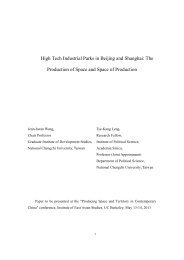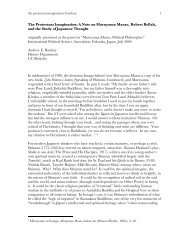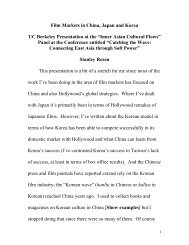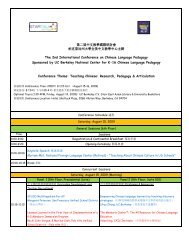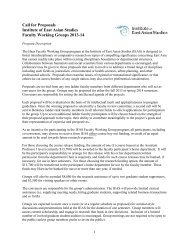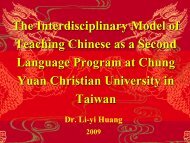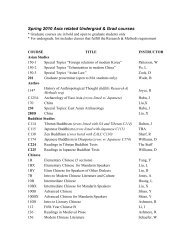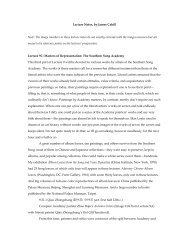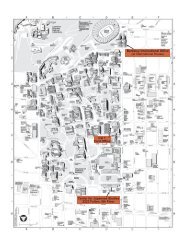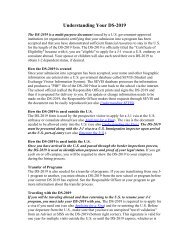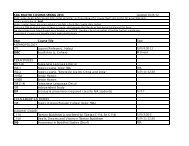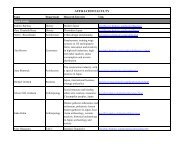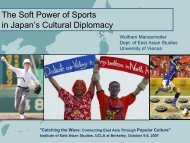Third Edition Spring 2013 - Institute of East Asian Studies, UC ...
Third Edition Spring 2013 - Institute of East Asian Studies, UC ...
Third Edition Spring 2013 - Institute of East Asian Studies, UC ...
You also want an ePaper? Increase the reach of your titles
YUMPU automatically turns print PDFs into web optimized ePapers that Google loves.
publicized an exchange <strong>of</strong> correspondence between twelve IndonesianENGO representatives and the president <strong>of</strong> the World Bank.The ENGO representatives had demanded that the World Bankwithhold funding until the Indonesian government could provethat the “large scale resettlement <strong>of</strong> farmers to the outer Indonesianislands is ecologically sustainable,” and would not “adverselyaffect primary tropical forests, important wetlands, and other keywildland areas.” 37 Another example involves the International NGOGroup on Indonesia (INGI), a network <strong>of</strong> Indonesian NGOs includingWAHLI. In 1995, INGI conducted interviews with several donorgovernments and the World Bank in order to educate them aboutthe environmental impact <strong>of</strong> the Kedung Ombo dam. As a result,several European countries pulled funding from dam projects inIndonesia, significantly angering the Suharto regime. 38 Overall, thedecision by Indonesian ENGOs to leverage foreign governmentsand international organizations that the Suharto regime dependedon, and the success <strong>of</strong> their efforts, provide further evidence thatthese actors were effective in supporting Indonesian ENGOs advocatingagainst Suharto regime policies.WAHLI, in particular, was especially successful in leveragingpowerful international actors to boost its domestic stature. Indeed,Joseph Molyneux argues that during the Suharto era, WALHI wasforemost in prominence among Indonesian NGOs and wielded significantpower in the Indonesian domestic political scene because<strong>of</strong> its global “web <strong>of</strong> influential contacts” that included foreign governments,international NGOs and intergovernmental organizations.39 For example, senior WALHI staff received invitations fromseveral Western governments, such as the U.S. and Sweden, to participatein all expense paid trips similar to those <strong>of</strong>fered by the U.S.State Department for senior foreign government <strong>of</strong>ficials. Thesetrips enabled WAHLI to form solid links with these governments,and gave them influence in the relationships <strong>of</strong> those governmentsand the Indonesian government. 40 Since the Suharto government37 Eldridge, Non-Government Organizations and Democratic Participation inIndonesia, 137.38 Hadiwinata, Politics <strong>of</strong> NGOs, 99.39 Molyneux, “Years <strong>of</strong> Living Dangerously.”40 Molyneux, “Years <strong>of</strong> Living Dangerously.”depended on assistance and goodwill from these Western governments,this tremendously increased the political power that WAH-LI enjoyed within Indonesia, and provides another explanationwhy the Indonesian government did not shut it down.ConclusionIn this paper, I have argued that ENGOs were able to operateand advocate openly in Indonesia in the 1980s and 1990sas a result <strong>of</strong> two main mechanisms: 1) Suharto’s reliance on EN-GOs to provide environmental services, which made him reluctantto fully suppress them, and 2) international support and fundingfor Indonesian ENGOs constrained Suharto’s ability to suppressthem, even if he had wanted to. However, I also highlight that theunderlying causal factor was actually Suharto’s extractive economicpolicies, coupled with a fall in oil prices in the 1980s. As a result<strong>of</strong> the high level <strong>of</strong> environmental degradation caused by hiseconomic policies, Suharto faced strong international pressure toresolve Indonesia’s severe environmental problems. However, hisability to do so was hampered by a fall in oil prices in the 1980s,which increased his government’s debt and reduced the level <strong>of</strong>expenditure it could afford. Consequently, he was forced to rely ondomestic ENGOs as well as international aid, leaving him unableto completely suppress ENGOs despite the existence <strong>of</strong> laws thattechnically empowered him to do so.REFERENCESAnderson, Benedict. “Elections and Democratisation inSoutheast Asia: Thailand, the Philipines and Indonesia.” Radioprogram by Australian Broadcasting Corporation Radio 24 Hours,1992. Quoted in Joshua Gordon, “NGOs, the Environment and PoliticalPluralism in New Order Indonesia,” Explorations in Southeast<strong>Asian</strong> <strong>Studies</strong> 2 (1998): 17.51 Rachel Phoa Environmental NGOs in Indonesia 52



